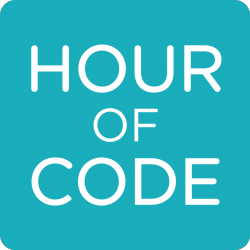This week, teachers and students around the world are participating in ‘Hour of Code™’ projects.
 It is huge! In its fifth year, there are over 100,000 registered events taking place in all corners of the globe. The ‘Hour of Code’ is an initiative by Computer Science Education Week and Code.org to introduce millions of students to one hour of computer science and computer programming.
It is huge! In its fifth year, there are over 100,000 registered events taking place in all corners of the globe. The ‘Hour of Code’ is an initiative by Computer Science Education Week and Code.org to introduce millions of students to one hour of computer science and computer programming.
While there is so much good and excitement in teaching kids to code, there are a few areas around it that deserve a bit of our time to discuss…
The Good
First off, for the record, I don’t hate ‘Hour of Code’ or teaching kids to code at all. The tech industry, both big and small players, have given countless hours and funding to education to provide quality free resources – that alone makes it a worthwhile cause.
And kids are loving it. We see story after story of kids as young as 4 that are spending their own time outside of school on coding games and projects. There are more opportunities for students to follow their own interests and learn skills at their own pace than ever before.
Plus, most schools don’t have educators in house with a coding background such that they’d be able to lead instruction of students without the resources that projects like ‘Hour of Code’ provide.
The Bad
Note: The following criticisms are not at all meant to minimize the benefits and impact described above!
It is frequently suggested that all kids should learn to code, much like we say all kids should learn math and sciences. We just need to be careful about our reasoning behind wanting these requirements to be implemented.
One argument made for why everyone should learn to code is that technology and coding expertise will lead to better jobs and, in particular, will be critical for the jobs of the future. But this tends to ignore all sorts of important skills and competencies that the tech industry desperately needs, like project and group management, user experience, design, marketing, data analysis, sales, writing technical documentation, and providing support to users. Most tech companies have more non-developers on staff than developers.
Of course, a basic background and understanding in logic, coding practices, and computer science concepts will be helpful to anyone in any industry, but most ‘Hour of Code’ activities tend to make the sole focus on “coding” and ignore everything else. We risk discouraging and leaving out all of the other critical needs of the very “jobs of tomorrow” we are trying to ready kids for.
The Ugly
My biggest fear is that one discouraging or unsuccessful experience of a student that participates in an ‘Hour of Code’ event may turn off some students for life. Any math teacher will tell you that simply getting students to believe that they can “do math” is often the biggest obstacle we face in the classroom. Coding is the same way, and a student that is confused after playing a coding game or isn’t successful the first time they try to program a robot will be that much harder to reach down the road.
So how do we ensure success? We must implement any coding program or activity in a purposeful way. Coding is about solving real problems, and if you ask just about any professional developer, they will tell you that they got their start because they wanted to fix, build, or improve something specific. For me (though I’m not a professional developer), it was building a website with static HTML for my high school marching band at the age of 14 – ya, I’m not nerdy at all!
Here’s the thing. The majority of activities that teach kids to code use games, apps, and robotics. They are often built or designed by companies that have the tech knowledge, but aren’t professional educators. And we usually implement ‘Hour of Code’ activities as a supplement and almost as an afterthought.
All of this can create a few problems:
- It can be unauthentic – kids will be more motivated and more likely to be successful when working on something meaningful or real. Their first coding experience should involve building something useful or that might serve a real purpose. As just one example, maybe students could experiment with basic CSS customizations of their WordPress site or blog on Edublogs. And here are some thoughts on teaching coding through math class.
- Not all kids like video games – the education community is all in on integrating game theory and games in learning. But the truth is, games are more motivating to some students than others. Like anything we do in teaching, there is no one-size-fits-all solution. Here are some ideas for teaching “coding” without any computer or device.
- Too much is not accessible – kids with various unique needs like visual impairments or inability to use a mouse are often left out with these sorts of apps and games. Assistive technologies and best accessibility practices need to be a high priority of every app and website we use with students.
So, just as you shouldn’t implement something like blogging in the classroom without a clear and specific purpose, the same should be for ‘Hour of Code’ and coding. Choose activities that are related to other subjects or topics you are teaching students, and not something that is just “one and done.” All of this will help set up students for success, and hopefully will lead to a solid foundation they’ll be able to build off for years to come.
Do you agree or disagree with anything above? And if you’ve used ‘Hour of Code’ activities in your classroom, how has it gone? We’d love to hear from you in the comments below!
Happy coding!


Coding is great to learn since it opens up doors to you when your older and even now!! It is amazing for games and other cool things. It Also give the ability to do what you want!!! I like It!!!! 🙂
I believe coding is very important part of games and also its fun and theres all different games to make and you can make your own games cya!
I believe coding is a very large topic that is growing in popularity rapidly. As the article touches on, our world has technology and advancements that our forefathers could never imagine for the future. With these technological advancements, I think that everyone should know at least the basics of coding so that any vital technologies that they are faced with in the future will be easier to understand. Although some are less drastic than others, every career has technology integrated into it now and it will only be more advanced in the future. I support programs like Hour of Code because they make something already so amazing even more fun than it already is.
I had very good experience with hour code because it talks about computer science and information what you should do
I have had a great experience with “Hour of Code”. It is a great way to abstract the complex computer science subjects. It takes months if not years for someone to learn programming languages such as Java, C, C#, python. Here you have one hour to play and create something with these languages. It helps to break the “fear of unknown” factor. I used the Hour of Code Robomesh virtual robotics activity for my Robotics class in my virtual class because our school was closed for security reasons. I would say let it live and add more content.
I am the kind of person who has never been good at this type of activity. I couldn’t even get myself out of Super Mario Land 1.1 when it came out. If I were younger and forced to do this prior to all the successes I have had in computers, software, networking, installing items, etc., I would have thought I was going into the wrong field.
In looking at all the jobs in the world, most do not code and have no reason to learn. I feel we are putting way too much energy into one area instead of just offering a variety of activities to our young students. I would rather they learn problem solving and more advanced thinking through Excel Problems not coding. That is more realistic as I am told by employers that our students are not proficient in Excel.
I have been in Business Education now Career Tech Education and have been exposed to many forms of programming and yes the dreaded hour of code on many different occasions. I have tried to embrace it but just become frustrated. If students do not want to do it, I wouldn’t be forcing them. Had I not had the experience I already had with computers, I would have lost all my confidence after that Hour of Code. I am NOT a fan.
In my opinion, the Hour of Code is not just about the coding. One of the biggest benefits I see in students is the development of their problem solving skills. I have my K-4 students participate in Hour of Code because if they develop problem solving skills, those skills can be used in every single career.
You’re exactly right. I teach Computer Science Discoveries through Code.org at my middle school. The entire first unit is all unplugged activities where they learn to problem solve using a lot of things that have nothing to do with technology.
I definitely agree! I fear that in many cases, the advertising and hoopla around it can miss that. That’s the fear 🙂
Hello
How do we get students interested in coding if they are pushing against the idea?
Hi Megan, a tough question! Even more than with some other subjects, finding a connection to an actual use for the student may help. Also, activities that require group collaboration may be good so that each student can contribute with different skills, but some of the “coding” aspects may rub off too.
Hi Ronnie,
Thank you for writing this honest post about coding. You’ve perhaps put into words what others are afraid to think or say.
When it comes to Hour of Code, there’s so much hype that perhaps people just think they “should” do it without evaluating it for themselves. It’s almost like a panic… “I better get on board because everyone else is!”
This reminds me of a recent post by AJ Juliani about The Ed Tech Hype.
He asks the question, “how can you use technology with purpose in a world of noise?”
I know a lot of people like coding and I’ve seen many students really in their element when introduced to coding. And seeing that first hand is really priceless. But it’s not for everyone. Personally, I have only learnt a little bit of ‘coding’ when I want to achieve an outcome on my blog. Having that specific goal or purpose, as you said, is so powerful.
So why not help those children who are really interested in coding to find that purpose rather than only play around with games?
And perhaps students who aren’t all that interested in coding, might realise how awesome it is to figure something out and fix a problem. I have had students in the past get great joy out of simple things — like learning how to express themselves better in blog comments by adding HTML for bold, italics, links, emojis etc. Or learning to modify a code to get an image or video displaying well on a post.
Then I would see other students ask them how they did that and a cycle of organic peer tutoring would begin. What teacher wouldn’t feel overjoyed to see that sort of scenario playing out in their classroom? ♥ 💡 😀 🙂 😎 ♥
Like many topics, the idea of coding isn’t a black and white issue. There’s a lot to think about here and I look forward to hearing others’ opinions.
Kathleen 🙂
All great points, many thanks for adding them to the conversation! And I hadn’t seen ‘The EdTech Hype’ post, pretty spot on 🙂
And another thought…I just read this post by Eric Curts about Logo and it reminded me of primary school in the 80s. That’s all we did with computers and it could have turned me off computers, and especially coding, for life. I found it the most boring thing in the world! Although clearly others loved it!